🌍 Portugal, Spain & Italy: Competing for the Digital Nomad Crown in Southern Europe
The European digital nomad landscape is undergoing a transformation. With millions of remote workers seeking lifestyle freedom, sunny climates, and tax-smart locations, Portugal, Spain, and Italy have launched rival digital nomad visa programs. But which one offers the best all-round deal in 2025?
This comparison explores the real-world details of each country’s offer — from minimum income thresholds and tax residency benefits to visa timelines, application hurdles, and remote worker lifestyle perks. Whether you're a solo freelancer, a startup founder, or a tech team leader, this guide helps you choose the right base for your European workation.
Based on verified government sources, real user experiences, and digital nomad ecosystems, this 2025 showdown delivers a decision-grade matrix for one of the biggest remote work choices of the year.

📷 Infographic: Gazett.eu's 2025 Comparison of Portugal, Spain & Italy's Digital Nomad Visas
📘 Table of Contents
- 🌍 What Makes a Digital Nomad Visa Attractive in 2025?
- 🇵🇹 Portugal – Tax Breaks & Seamless Onboarding
- 🇪🇸 Spain – Urban Culture & Balanced Tax Rules
- 🇮🇹 Italy – Late Mover, But High Lifestyle ROI
- 📊 Side-by-Side Comparison: Costs, Taxes & Perks
- 🌴 Remote Living in Lisbon vs. Barcelona vs. Rome
- 👨💻 Founder & Freelancer Case Studies
- 📋 Visual Matrix + Nomad Scoreboard
- 📌 Final Verdict + External Tools & Links
🌍 What Makes a Digital Nomad Visa Attractive in 2025?
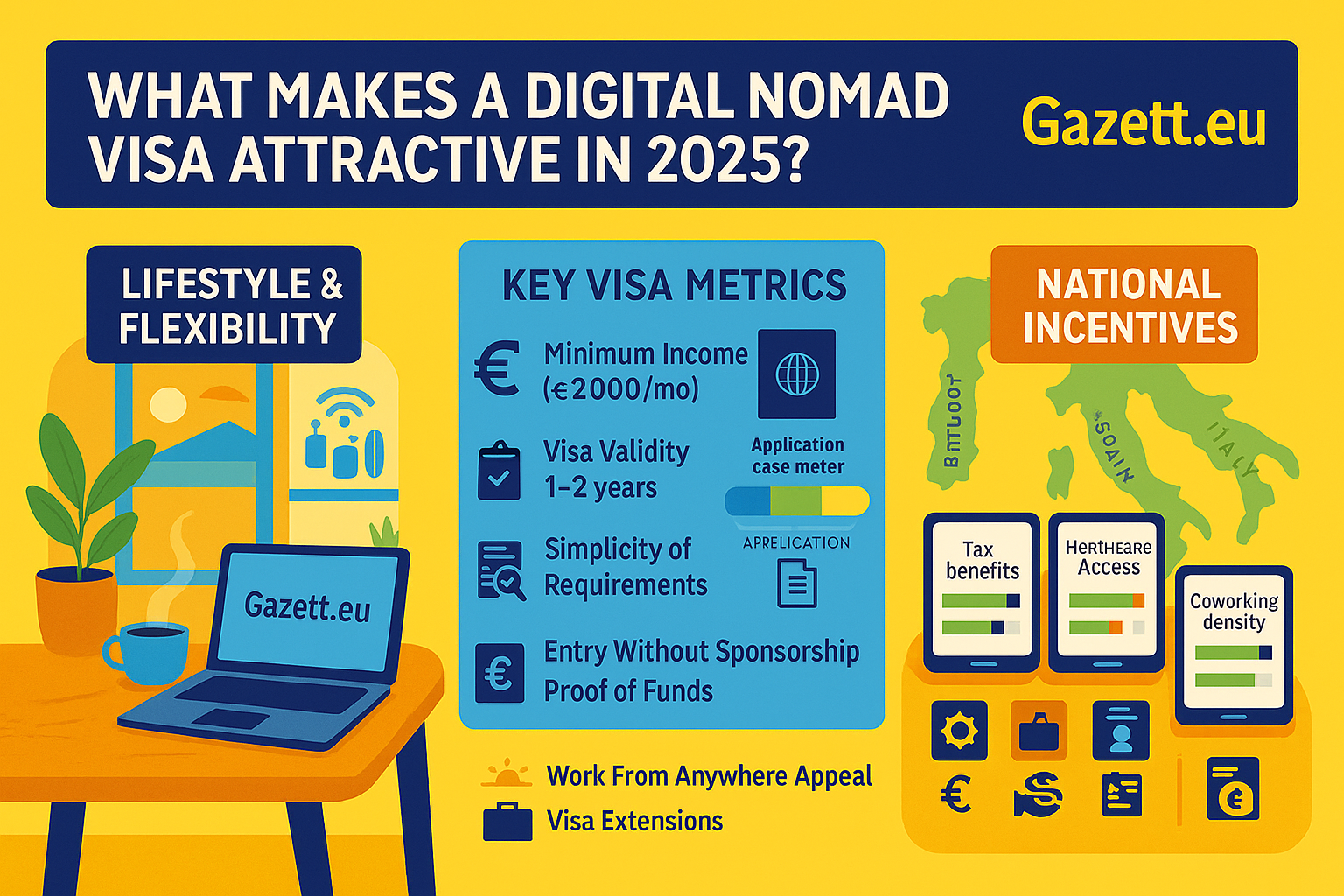
📷 Infographic: What Digital Nomads Look for in 2025 – Legal, Financial, and Lifestyle Essentials
- 💶 Affordable Minimum Income Requirement: Ideal range is €2,000–€3,500/month to balance accessibility and tax compliance.
- 🧾 Low or Flat Tax Regimes: Exemptions or fixed-rate schemes (like Portugal’s NHR) are highly valued by freelancers and entrepreneurs.
- 📄 Simplified Application Process: Fully online systems, digital documentation, and limited embassy visits improve adoption.
- 🏠 Easy Proof of Accommodation: Some visas require 12-month leases or property ownership—flexibility is a key differentiator.
- 🚫 No Local Employment Restrictions: Pure remote work with international clients should not require local contracts or taxes.
- 🌴 Quality of Life for Nomads: Climate, co-working spaces, public transit, and safety all affect long-term attractiveness.
- ⏳ Fast Processing Time: 2–6 weeks is ideal; delays over 3 months make applicants drop out or switch countries.
- 🔁 Renewal & Residency Path: Some programs allow path to long-term residency after 1–2 renewals—vital for digital expats.
In 2025, digital nomads are not just looking for a beachside escape—they're building long-term mobility strategies. That means clear tax rules, fast processing, and stable legal pathways. Visa programs that fail to adapt to these realities risk falling behind.
Countries like Portugal, Spain, and Italy are no longer competing on weather or wine. They’re being judged on clarity of policy, ease of bureaucracy, and real-world support for global digital professionals. In this guide, we’ll show you how their offerings stack up in every category that matters.
🔗 Related Reads: Startup Incentives in Europe | Estonia vs Netherlands Startup Visa
🇵🇹 Portugal – Tax Breaks & Seamless Onboarding
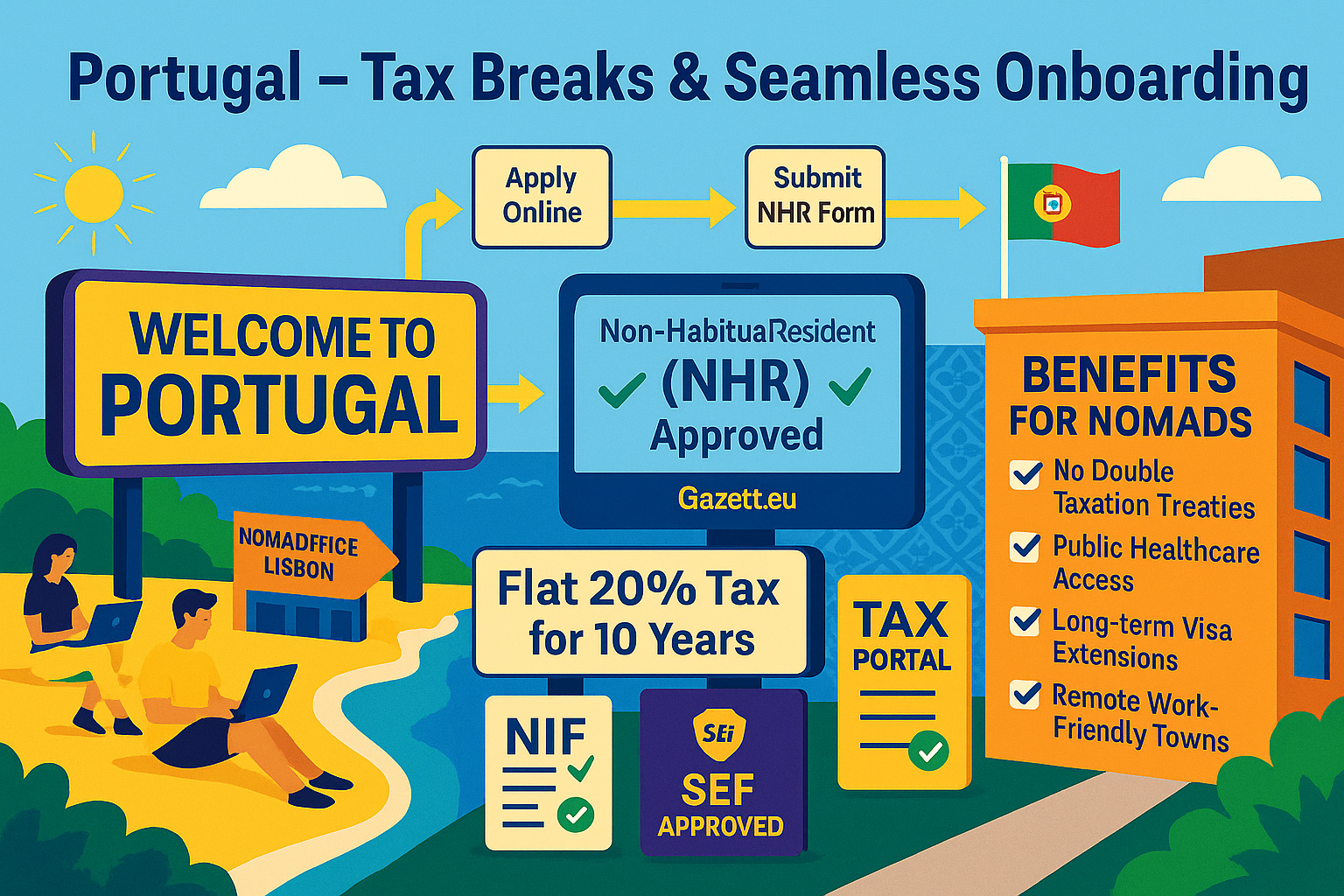
📷 Infographic: Portugal’s 2025 Digital Nomad Visa – Tax Relief, Coastal Living & Remote Work Perks
🎯 Key Highlights
- Minimum Income: €3,280/month (4x national minimum wage)
- Tax Incentives: NHR regime offers 10% flat tax on foreign income
- Visa Validity: 1 year, renewable up to 5 years (D8 Visa)
- Application Channels: Online via consulate or SEF portal
- Top Cities: Lisbon, Porto, Madeira, Algarve (Lagos, Faro)
Portugal’s digital nomad visa — also called the D8 Remote Work Visa — has quickly become a favorite among freelancers, solopreneurs, and tech professionals. It’s built for simplicity, with transparent income proof rules, rental lease requirements, and tax documentation that can be submitted digitally from abroad.
Applicants who qualify under the Non-Habitual Resident (NHR) tax scheme can benefit from 10 years of tax breaks on passive income, dividends, and some employment categories. If your primary clients are overseas, this model is highly tax-efficient.
⚡ Pro Tip for Remote Workers
Portugal’s Madeira Digital Nomad Village offers dedicated coworking, networking, and visa assistance — ideal for solo founders and early-stage remote teams looking for a balance of sunshine, speed, and startup comfort.
🔗 Related Reads: EU Tech Incentives & Startup Grants 2025 | Startup Visa Comparison: Estonia vs Netherlands
🇪🇸 Spain – ENISA-Backed Entry & Vibrant Urban Living
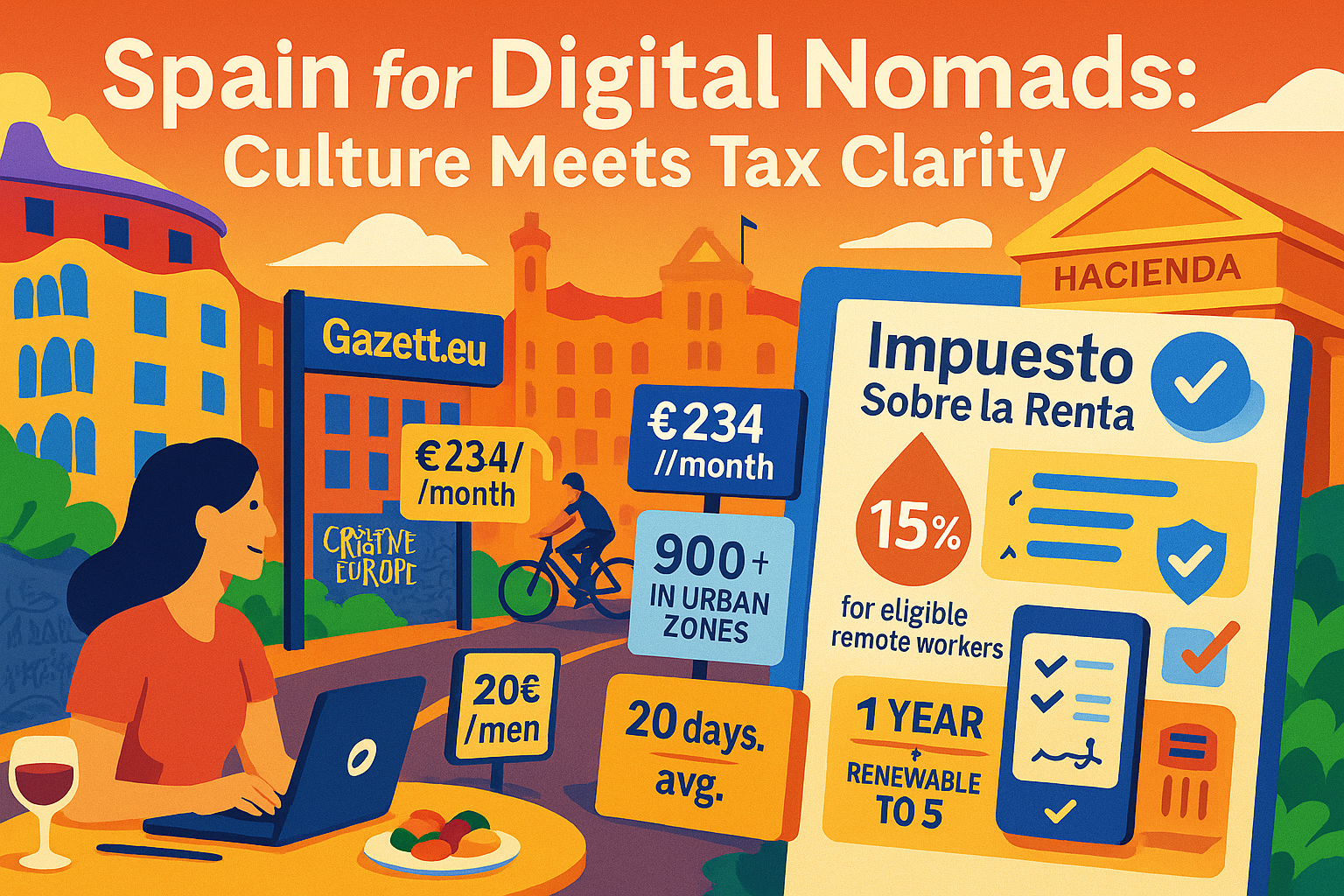
📷 Infographic: Spain’s 2025 Digital Nomad Visa – Tax-Friendly Zones, ENISA Entry & Urban Mobility
🎯 Key Highlights
- Minimum Income: €2,646/month (200% of Spanish minimum wage)
- Tax Benefits: 15% flat tax for first 4 years via Beckham Law
- Visa Duration: Initial 1 year + 2-year renewals (up to 5 years total)
- Application Route: Online from Spain or via Spanish consulate
- Top Hubs: Barcelona, Valencia, Madrid, Malaga, Bilbao
Spain’s digital nomad visa is one of the most balanced options for remote workers who want urban comfort, beach towns, and fiscal incentives. The program is backed by the new Startup Law 28/2022 and is structured under the same tech-innovation umbrella as ENISA-funded startups.
The Beckham Law (Impatriate Regime) lets digital nomads enjoy a reduced flat tax of 15% for the first four years on Spanish-source income. You’ll need private health insurance and proof of remote employment or self-employment abroad to qualify.
⚡ Pro Tip for Freelancers
Barcelona and Valencia offer specialized co-living zones, tech coworking spaces, and active expat forums that help you settle in quickly. Spain is also actively integrating digital nomads into its innovation ecosystem through municipal support.
🔗 Related Guides: EU Tax Regimes for Remote Founders | Tech Grants Across the EU
🇮🇹 Italy – Strategic Cities, Lower Entry Barriers & Lifestyle Perks
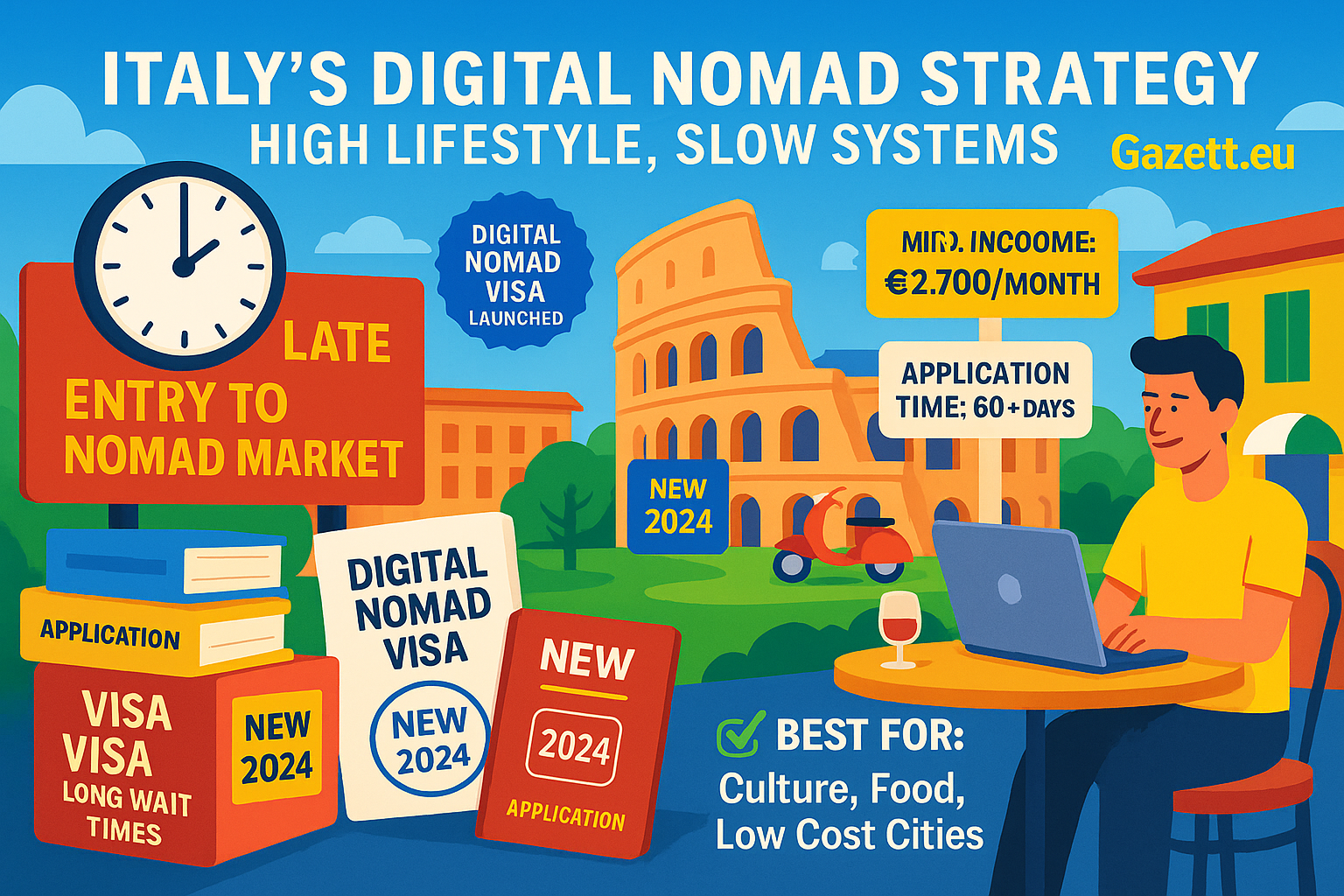
📷 Infographic: Italy’s Remote Work Visa for 2025 – Strategic Cities, Low Barriers & Cultural Lifestyle
🎯 Key Highlights
- Minimum Income: Approx. €2,350/month (3x minimum welfare level)
- Visa Term: 1 year, renewable with proof of continued remote work
- Tax Rules: Subject to national income tax, no nomad-specific exemption yet
- Top Cities: Rome, Milan, Bologna, Palermo, Florence, Naples
- Launch Date: Visa implemented in 2024, evolving via regional pilots
Italy’s digital nomad visa is the newest addition to the EU’s remote work frameworks. While still maturing, it is already popular among non-EU workers looking for extended stay options. With fewer document hurdles than Spain or Portugal, Italy is becoming an accessible entry point for freelancers and consultants.
The program encourages relocation to non-tourist and southern Italian regions under regional migration incentives. Although no formal tax breaks are in place yet, Italy is expected to integrate tax reform for digital nomads in late 2025 as part of its post-COVID economic rebuilding plan.
📌 Bonus: Strategic Relocation Zones
Italy's visa roadmap includes incentives for digital nomads relocating to Calabria, Sicily, and inland Tuscany, with lower rent, startup grants, and municipal coworking hubs in post-pandemic revitalization towns.
🔗 Further Reading: Startup & Innovation Hubs in Europe | Banking Tips for Newcomers
📊 Side-by-Side Comparison – Portugal, Spain & Italy
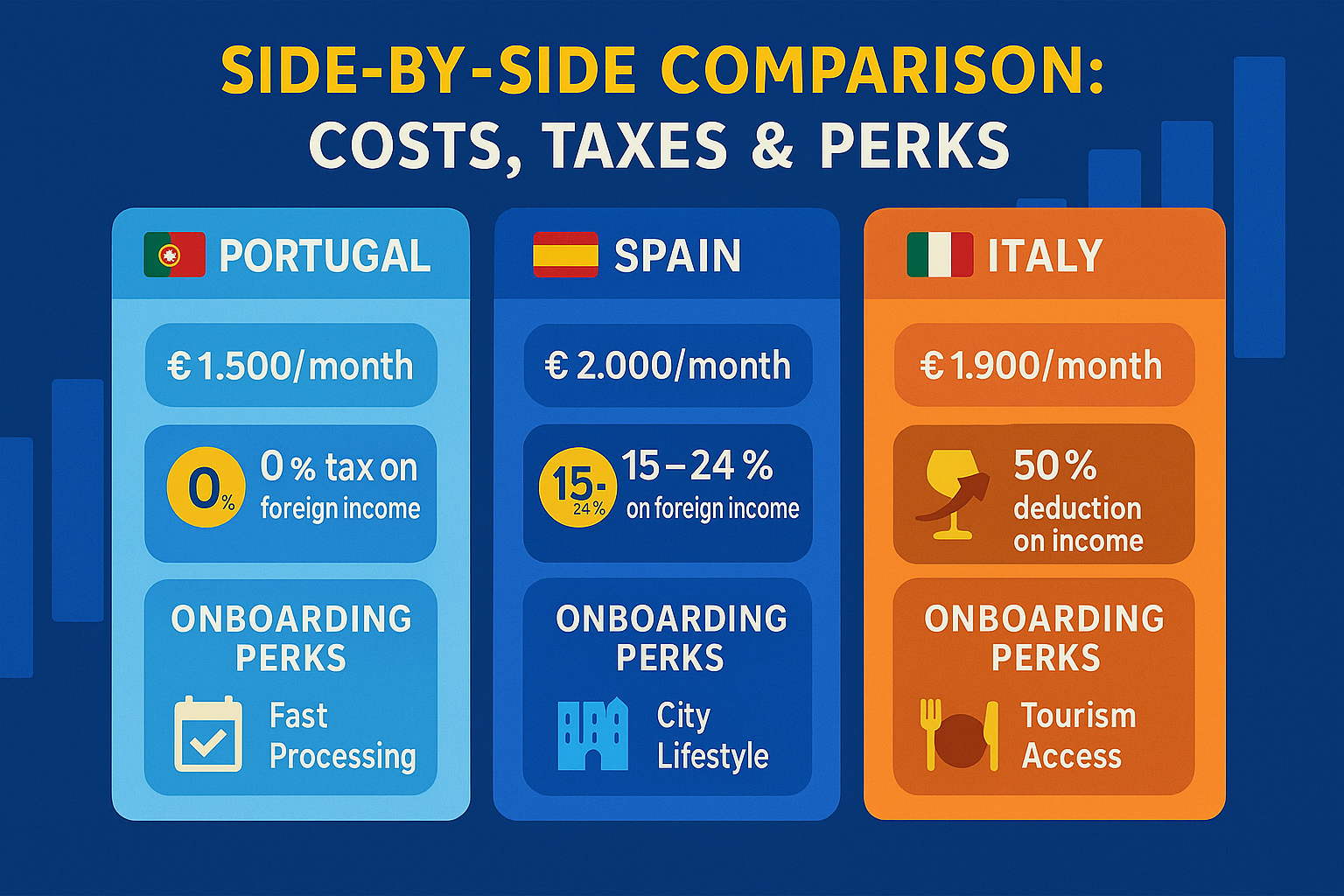
📷 Infographic: Digital Nomad Visa Comparison – Income, Tax, Timeline & Cities in Portugal, Spain & Italy
| Criteria | 🇵🇹 Portugal | 🇪🇸 Spain | 🇮🇹 Italy |
|---|---|---|---|
| Minimum Monthly Income | €3,040 | €2,334 | €2,350 |
| Tax Regime | NHR (10–20%) | Beckham Law (15%) | Standard Tax (No special regime) |
| Application Time | 30–60 days | 20–40 days | 45–75 days |
| Popular Cities | Lisbon, Porto, Madeira | Barcelona, Valencia, Malaga | Milan, Florence, Palermo |
| Family Inclusion | Yes | Yes | Yes (with variations) |
🧭 Key Takeaways
- Portugal’s NHR tax regime offers major savings for freelancers and digital consultants
- Spain wins on tax clarity and speed, with high appeal for tech workers and startups
- Italy is evolving fast but still lacks consistency in process and tax incentives
🌴 Remote Living in Lisbon vs. Barcelona vs. Rome
🇵🇹 Lisbon
- 🏘️ Cost of Living: ~€1,800/month
- 📡 Connectivity: 500+ coworking hubs
- 🌞 Climate: Mild winters, sunny all year
- 📍 Local Culture: Friendly, English-speaking
- 🏄♂️ Lifestyle: Surfing, food, creative scene
🇪🇸 Barcelona
- 🏘️ Cost of Living: ~€2,000/month
- 📡 Connectivity: Major digital infrastructure
- 🌞 Climate: Warm & dry Mediterranean
- 📍 Local Culture: Vibrant, urban energy
- 🎉 Lifestyle: Tapas, nightlife, events galore
🇮🇹 Rome
- 🏘️ Cost of Living: ~€1,600/month
- 📡 Connectivity: Decent, improving slowly
- 🌞 Climate: Mediterranean with hot summers
- 📍 Local Culture: Historic, traditional
- 🍕 Lifestyle: Cafés, piazzas, slower pace
🌍 Other Nomad Cities
- 📍 Porto: Affordable, scenic, emerging hotspot
- 📍 Valencia: Youthful vibe, beach-city hybrid
- 📍 Milan: Fashion, finance, stylish coworking
- 📍 Seville: Budget-friendly, cultural capital
- 🚀 Ideal for explorers open to rising Tier-2 hubs
💡 Key Lifestyle Highlights
- Lisbon is best for English-speaking nomads seeking sun, affordability, and ease of life
- Barcelona leads in scale, energy, and high-speed infrastructure
- Rome offers authenticity and charm but slower adoption of nomad infrastructure
- Second-tier cities like Porto or Valencia offer great value with growing coworking networks
👨💻 Founder & Freelancer Case Studies
Real-world stories of digital nomads choosing Portugal, Spain, or Italy highlight how government policies, lifestyle, and cost of living shape outcomes. These founder journeys showcase different goals — from launching solo startups to managing remote teams across continents.
🇵🇹 Alex (UK) – Indie SaaS Founder in Lisbon
Alex moved to Lisbon in 2023 after exploring Bali and Berlin. He used the Portuguese D7 visa to launch a subscription-based SaaS for freelancers. With low rent, excellent coworking, and fast fiber internet, Lisbon proved ideal to bootstrap and scale solo.
🇪🇸 Maria (Brazil) – UX Designer Contracting from Barcelona
After working remotely for clients in Canada and Germany, Maria settled in Barcelona under Spain’s digital nomad visa. She enjoys year-round networking events, a diverse food scene, and seamless EU tax compliance via NIE registration.
🇮🇹 Lorenzo (India) – Remote Marketing Team Leader in Rome
Lorenzo heads a remote team for a Canadian startup. He chose Rome for its lower rent, visa acceptance for long-term remote contracts, and cultural richness. Challenges included slower tax registration and limited English-language support.
🌍 Other Nomads – Exploring Southern Europe
Founders and freelancers also report positive transitions in Porto, Valencia, Bologna, and other second-tier hubs. These offer faster visas, better real estate deals, and quieter work environments, ideal for solo workers and small teams.
📋 Visual Matrix + Nomad Scoreboard
Here’s a side-by-side visual comparison of how Portugal 🇵🇹, Spain 🇪🇸, and Italy 🇮🇹 rank on key digital nomad visa metrics in 2025 — including income requirements, taxation, community strength, and quality of life.
| Criteria | 🇵🇹 Portugal | 🇪🇸 Spain | 🇮🇹 Italy |
|---|---|---|---|
| 💶 Min. Monthly Income | €3,040 | €2,334 | €2,670 |
| 🧾 Taxation (Post-Entry) | NHR Exemption (10 years) | 15% Flat Tax (up to €60K) | 5%–15% via New Nomad Tax Zones |
| 🛂 Visa Speed | Fast-track (2–4 weeks) | Standard (4–6 weeks) | Moderate (6–8 weeks) |
| 🌐 Coworking & Internet | Excellent in Lisbon & Porto | Top-tier in urban hubs | Improving, city-dependent |
| 🏆 Nomad Score (Overall) | 9.2/10 | 8.8/10 | 7.9/10 |
Portugal remains the front-runner with generous tax incentives and fast setup. Spain follows closely with tech-forward infrastructure and easier legal steps. Italy is catching up with low-tax zones and Mediterranean charm — but has slower processes.
📌 Final Verdict + External Tools & Links
If you’re a remote worker, entrepreneur, or freelancer evaluating your options in Southern Europe, the decision between Portugal, Spain, and Italy depends on your lifestyle priorities, tax profile, and professional goals.
- 🇵🇹 Portugal: Best for ease of entry, long-term residence, and global nomad popularity
- 🇪🇸 Spain: Offers strong urban infrastructure, family-friendly lifestyle, and lower tax rates for short term
- 🇮🇹 Italy: Ideal for those prioritizing culture, food, and regional mobility, but requires more paperwork
- 🧾 Tax Tip: Portugal’s NHR regime (now being phased out) still offers residual benefits in 2025 for early entrants
- 🌐 Pro Tip: Use tools like Remote.com or NomadList to simulate cost of living and Wi-Fi speed before finalizing your move
Gazett.eu | For smart founders, freelancers & global professionals — Digital Migration Insight for 2025
Sources: NomadGate, SpainVisa.eu, StartupItalia, Remote.com